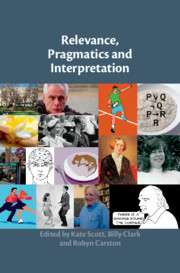Book contents
- Relevance, Pragmatics and Interpretation
- Relevance, Pragmatics and InterpretationEssays in Honour of Deirdre Wilson
- Copyright page
- Contents
- Contributors
- Cover Acknowledgements
- Introduction
- Reflections on the Development of Relevance Theory
- Part I Relevance Theory and Cognitive Communicative Issues
- Part II Pragmatics and Linguistic Issues
- Part III Figurative Language and Layered Interpretations
- 15 Metaphor and Metonymy in Acquisition
- 16 Relevance and Metaphor Understanding in a Second Language
- 17 Component Processes of Irony Comprehension in Children
- 18 Allegory in Relation to Metaphor and Irony
- 19 Slave of the Passions
- 20 Adaptations as Communicative Acts
- References
- Author Index
- Subject Index
19 - Slave of the Passions
Making Emotions Relevant
from Part III - Figurative Language and Layered Interpretations
Published online by Cambridge University Press: 08 July 2019
- Relevance, Pragmatics and Interpretation
- Relevance, Pragmatics and InterpretationEssays in Honour of Deirdre Wilson
- Copyright page
- Contents
- Contributors
- Cover Acknowledgements
- Introduction
- Reflections on the Development of Relevance Theory
- Part I Relevance Theory and Cognitive Communicative Issues
- Part II Pragmatics and Linguistic Issues
- Part III Figurative Language and Layered Interpretations
- 15 Metaphor and Metonymy in Acquisition
- 16 Relevance and Metaphor Understanding in a Second Language
- 17 Component Processes of Irony Comprehension in Children
- 18 Allegory in Relation to Metaphor and Irony
- 19 Slave of the Passions
- 20 Adaptations as Communicative Acts
- References
- Author Index
- Subject Index
Summary
Tim Wharton and Claudia Strey make the case that it is time to develop an account of how emotions are expressed and communicated and to fully integrate it into pragmatic theory. They discuss the descriptive ineffability of emotional communication and argue for the introduction of a new notion of ‘positive emotional effect’ to complement the existing notion of ‘positive cognitive effect’. They also suggest that recent developments in relevance theory, specifically work on indeterminacy of meaning and on procedural meaning, make it uniquely capable of accommodating these vaguer aspects of communication.
Keywords
- Type
- Chapter
- Information
- Relevance, Pragmatics and Interpretation , pp. 253 - 266Publisher: Cambridge University PressPrint publication year: 2019
- 21
- Cited by

